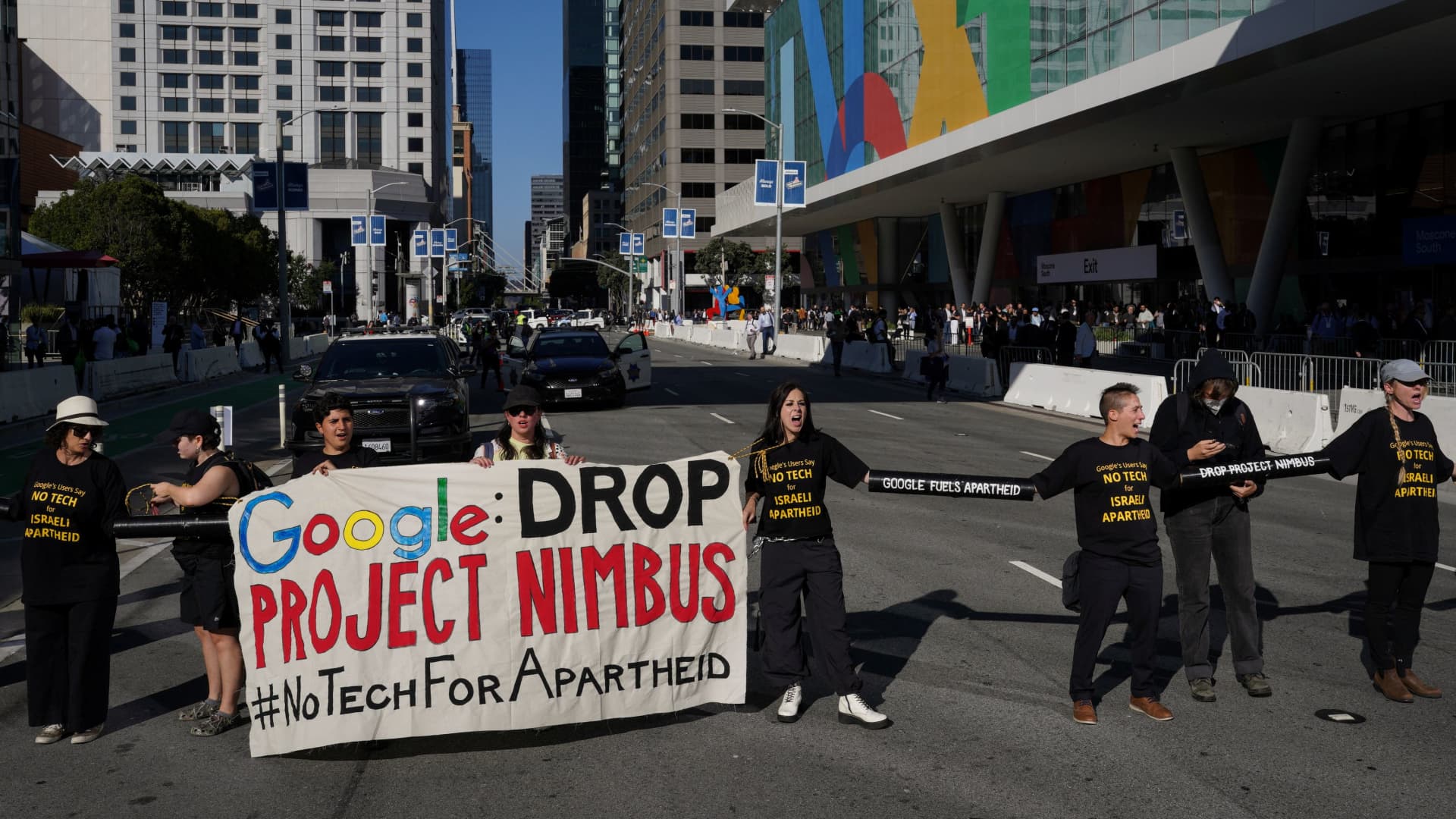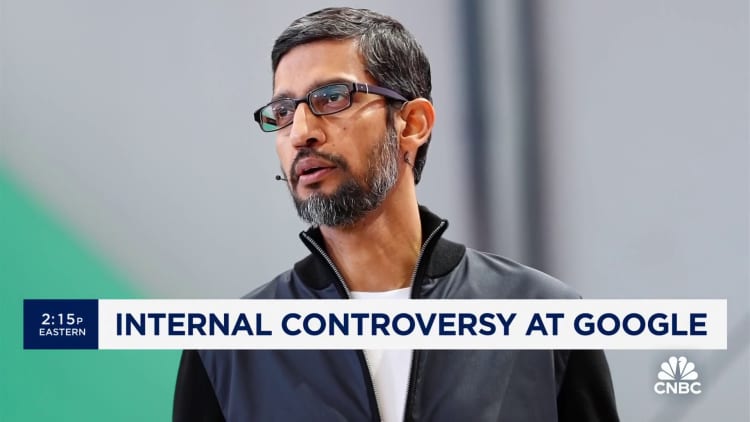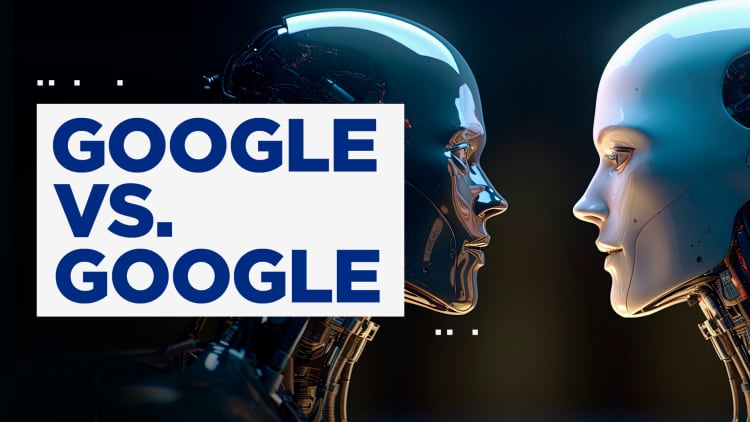Google fires employee who protested Israel tech event, as internal dissent mounts


During a keynote speech in New York on Monday from the managing director of Google’s Israel business, an employee in the company’s cloud division protested publicly, proclaiming “I refuse to build technology that powers genocide.”
The Google Cloud engineer was subsequently fired, CNBC has learned, marking another dark moment for Google, which has been thrust into an escalating number of political and cultural conflicts in recent years and has struggled to quell employee dissent.
There was more internal controversy this week, also tied to the crisis in Gaza.
Ahead of an International Women’s Day Summit in Silicon Valley on Thursday, Google’s employee message board was hit with an influx of staffer comments about the company’s military contracts with Israel. The online forum, which was going to be used to help inform what questions were asked of executives at the event, was shut down for what a spokesperson described to CNBC as “divisive content that is disruptive to our workplace.”
Google’s role as a provider of technology to militaries in the U.S. and abroad has been a source of workforce consternation since at least 2018, when employees protested a Defense Department contract called Project Maven. Then came controversy surrounding Project Nimbus, a $1.2 billion artificial intelligence and computing services agreement among Google, Amazon Web Services and the Israeli government and military that began in 2021.
That outrage has spread to a host of other issues, often leaving CEO Sundar Pichai on the defensive when confronted by employees at company events.
The escalation of the Middle East conflict over the past five months has increased the tension level at Google even further. In October, Hamas launched multipronged and deadly attacks on Israel, leading to a military response that’s killed at least 30,000 Palestinians, with many more injured and facing starvation, according to the Palestinian enclave’s Health Ministry.

In recent weeks, more than 600 Google workers signed a letter addressed to leadership asking that the company drop its sponsorship of the annual Mind the Tech conference promoting the Israeli tech industry. The event on Monday in New York featured an address from Barak Regev, managing director of Google Israel.
A video of the employee protesting during the speech went viral.
“No cloud for apartheid,” the employee yelled. Members of the crowd booed him as he was escorted by security out of the building.
Regev then told the crowd, “Part of the privilege of working in a company, which represents democratic values is giving the stage for different opinions.”
A Google spokesperson said the employee was fired for “interfering with an official company-sponsored event” in an email to CNBC on Thursday. “This behavior is not okay, regardless of the issue, and the employee was terminated for violating our policies.” The spokesperson didn’t specify which policies were violated.
More questions about Gemini
Google is far from alone among U.S. companies in facing increased pressure since the latest war broke out between Hamas and Israel.
In October, Starbucks sued Workers United, which has organized employees in 400 U.S. stores, over a pro-Palestinian message posted on a union social media account. Starbucks said it was trying to get the union to stop using its name and likeness, as the post also drew protests from pro-Israel demonstrators. Boycotters said the company wasn’t adequately supporting Palestinians in the Gaza Strip.
McDonald’s has been the subject of a boycott effort after a local franchisee in Israel announced in October that it was providing free meals to Israeli soldiers.
Ahead of Google’s International Women’s Day summit on Thursday, called Her Power, Her Voice, some women filled the company’s internal discussion forum Dory with questions about how the Israeli military contract and Google’s AI chatbot Gemini are impacting Palestinian women. Some of the comments had hundreds of “upvotes” from employees, according to internal correspondence viewed by CNBC.
One employee asked about Gemini’s bias. Specifically, the person wrote that when asking Gemini, “Do women in Gaza deserve human rights?” the chatbot didn’t have a response and directed the user to try Google search. But when the employee asked the same question of women in France, Gemini answered “Absolutely,” followed by multiple bullet points backing up the assertion.
CNBC replicated the search Thursday afternoon and found the same results. Late last month, Google paused its Gemini image generation tool after saying it offers “inaccuracies” in historical pictures, in response to a barrage of user complaints.
Another highly-rated comment on the forum asked how the company is recognizing Mai Ubeid, a young woman and former Google software engineer who was reportedly killed in an Israeli airstrike in Gaza along with her family late last year. (Some employees and advocacy groups gathered to honor Ubeid in New York in December.)
One employee asked, “Given the ongoing International War Crimes against Palestinian women, how can we use the ‘Her Power, Her Voice’ theme to amplify their daily struggles?” The comment received over 100 upvotes.
“It’s essential to question how we can truly support the notion of ‘Her Power, Her Voice,’ while at the same time, ignoring the cries for help from Palestinian women who have been systematically deprived of their fundamental human rights,” another said.
As the number of comments swelled, Google prematurely shut down the forum.
Google’s spokesperson didn’t address any of the individual posts but provided the following statement to CNBC:
“We were pleased to host an event to celebrate International Women’s Day. Unfortunately, before the event a series of off-topic and divisive questions and comments were posted to internal forums. Our internal community guidelines team routinely removes divisive content that is disruptive to our workplace, and did that here.”
WATCH: Google vs. Google










